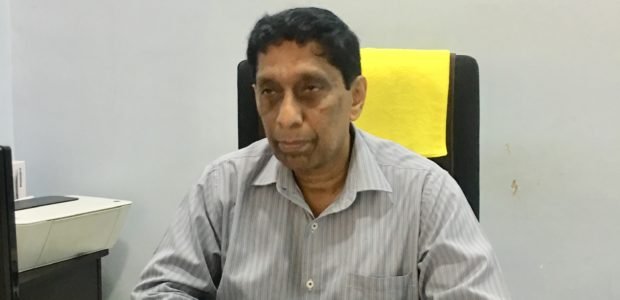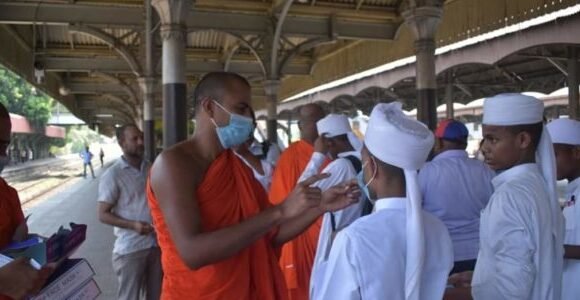
Organ Donors: No racial discrimination when saving a life
PRIYADHARSHINI SIVARAJAH
“A person’s organs can be surgically implanted into another person’s body in order to save them. We never ask anyone their religion or ethnicity when coming to our bank either to donate or receive organs. Neither do they ask because this is immaterial. They need an organ to survive. As human beings, all are equal. Humanity is here to surpass everything” says Hemaka De Mel, Senior Manager, Sri Lanka Human Tissue Bank during an interview with Catamaran recently.
The Catamaran: When did the ‘Human Tissue Bank of Sri Lanka’ start?
Hemaka De Mel: Founded in 1996 by Doctor Hudson Silva, the Human Tissue Bank is a leading organ donor body in Sri Lanka and is a subsidiary of the Eye Donation Society. From storing and processing body organs for donation, we provide free services ranging from preparing and delivering based on the needs of patients and doctors. People come here from far away places like Jaffna and Mullaithivu in the hope of receiving human organs. We help all of them irrespective of Sinhala, Muslim or Tamil differences. I have been the Senior Manager since the inception of this bank and there are 5 employees working with me.
The Catamaran: To what extent are the people of Sri Lanka aware of the donation of organs?
Hemaka De Mel: Buddhism always gives priority to charitable acts. Furthermore, every religion in Sri Lanka appreciates the donation of organs. So our people are aware of the importance of donating organs. We never ask from those who come to us for organs about their religion or ethnicity. Neither do they ask. In the act of saving a life there is no place for religion and ethnicity. Everyone is human. Those in the north can receive organs of people from the south or the east. It doesn’t matter to us. It doesn’t matter to them.
A Muslim person who fractured his leg in an accident came to us for a suitable limb. He appreciated our services and donated a lot of money to us. Similarly, Tamil and Muslim philanthropists have helped us a lot. All these are examples of people being aware of the greatness of organ donations.
The Catamaran: What can you say to people who are still unaware organs donations?
Hemaka de Mel: A life is saved by organ donation. Death is an irreparable loss, but by donating the organs of a deceased person, the family can be comforted. Organs such as the kidneys, liver, lungs, eye, bone, muscle, pancreas, limbs, knee caps, and cranial parts of the head are stored and preserved in our bank. We give these to our patients according to their needs free of charge.
We do not get organs from all those who died such someone murdered, suicide victims, those who die of bomb blasts and wars, or those who die of viral, fungal, bacterial diseases, cancer, tuberculosis and those of who die due to injuries. We receive organs from people who die of heart disease, diabetes and brain death. Thus, we get very few organs as donations.
The Catamaran: How can the public donate organs?
Hemaka de Mel: We should receive the eye within 4 hours and other organs within 12 hours of death. There is no age limit for eye donation. But other organs can only be donated from the bodies of 15 to 70-year-olds. A person’s authorizing letter while he/she was alive or obtaining the permission of close relatives of the deceased person will be required for the organ donation. Mostly women volunteer to donate organs to us. Women have the magnanimous mind to donate organs of their husbands or close male relatives with the hope that somebody who is in need will be benefitted.
If the members of an impoverished family donate organs, we undertake to cover funerals expenses in exchange for the donation. When the bodies are brought to us we remove the particular organs and help them bury the body according their respective religious beliefs.
Those who wish to donate their organs during their life-time can register through our web site: htb.mobitel.lk.
The Catamaran: Which part of the body of man is more in demand today?
Hemaka de Mel: Bones are in great demand because there are more and more road accidents or people falling from trees and buildings etc. There are bone related diseases also. Doctors, victims and patients approach us for replacement of broken bones. On average we get about 80 such requests monthly.
The Catamaran: Tell us about your work during the war period in Sri Lanka?
Hemaka de Mel: During the war, in spite of various challenges, we went to the North to save the lives of patients. Organs that are securely carried and transported to the North had to go through heavy security at the Mukamalai check-point and due to such checking, the organs would get ruined. We had to undergo a big task in convincing both the Government Security Forces and the LTTE to prevent this from recurring. In some cases, both sides agreed to take the organs safely to patients after our explanation. In this way we also act as a humanitarian bridge connecting races.
The Catamaran: You use high-end techniques to preserve organs and donating them to the needy, free of charge. How do you get financial assistance to this?
Hemaka de Mel: The organs we give to save lives have to be suitable for transplant. To keep them in such good condition the air conditioners used alone are worth Rs 2.9 million. We also have a radiation machine for disinfection. We pay over Rs. 300,000 monthly for the refrigerated AC room alone. Since we are a subsidiary of the Sri Lanka Eye Donation Society we get some financial assistance. It is necessary to keep the donated organs in chilling condition of minus 60 to minus 80 degrees for about 5 years. To offset the expenses we seek donations from philanthropists, the help of social service agencies, and the renting out of the top floor of the building and get some income. But this is certainly not enough.
The Catamaran: Has your bank provided free services to victims of the April 21 attacks?
Hemaka de Mel: The affected skull portions of two 10-year-old and 3-year-old girls in Katuwapitiya are being preserved here. We must preserve and process this until the time they undergo the surgery. Based on the Skull Flap Project we carry out this task so that many patients with head injuries will have a better life.
The Catamaran: Tell us more about The Skull Reconstruction Project?
Hemaka De Mel: This project was an initiative of Ahmed Shyam, a physician in the Department of Neurology. We are indebted to him for helping set an example. Patching up a damaged human skull is a serious task. The damaged part of the skull is removed from the head and either sewn into the patient’s stomach for later use or thrown away. This procedure was followed by Sri Lankan doctors until 4 years ago. Doctors place a titanium plate or an iron mesh in place of the patient’s removed skull areas. For this purpose, patients have to spend hundreds of thousands of Rupees. One square centimeter titanium costs around 2 to 3 lakhs alone. A patient who cannot afford a titanium plate is patched with flex which may cause brain damage and infection, resulting in death. Our project has helped circumvent this situation for several people.
The Catamaran: Is this service also free of charge?
Hemaka de Mel: For the first 2 years of this programme, we offered free services. However, due to the increased cost of maintenance, cost of processing and cost of radiation equipment usage, we now charge Rs. 4,000 from each patient. If we have sufficient funds, we can still do this for free. We do not charge any fee from the most impoverished patients.
The Catamaran: Does your service get government support?
Hemaka de Mel: We can serve the people better if the government supports our services. We can save more lives if they offer us legal authorization to receive human organs as donation from government hospitals nationwide. I request the government to grant us this authorization.
This article was originally published on the catamaran.com







